How to check jvm and thread usage: execute the [jmap -heap PID] command to check the jvm usage; execute the [jstack pid] command to check the thread usage.

View jvm usage
(Video tutorial recommendation: java course)
jmap -heap PID
View Thread usage
jstack pid
jstack is a stack tracing tool that comes with the Java virtual machine and is used to generate a thread snapshot of the current moment of the Java virtual machine.
Thread snapshots are a collection of method stacks being executed by each thread in the current Java virtual machine. The main purpose of generating thread snapshots is to locate the reasons for long pauses in threads, such as inter-thread deadlocks, infinite loops, etc. Long waits caused by requesting external resources, etc.
When a thread pauses, you can check the call stack of each thread through jstack to know what the unresponsive thread is doing in the background or what resources it is waiting for. If the Java program crashes and generates a core file, the jstack tool can be used to obtain the Java stack and native stack information of the core file, so that you can easily know how the Java program crashed and where the problem occurred in the program.
In addition, the jstack tool can also be attached to the running java program to see the java stack and native stack information of the java program running at that time. If the java program currently running is in a hung state, jstack is Very useful.
Related recommendations:Getting started with java
The above is the detailed content of How to check jvm and thread usage. For more information, please follow other related articles on the PHP Chinese website!
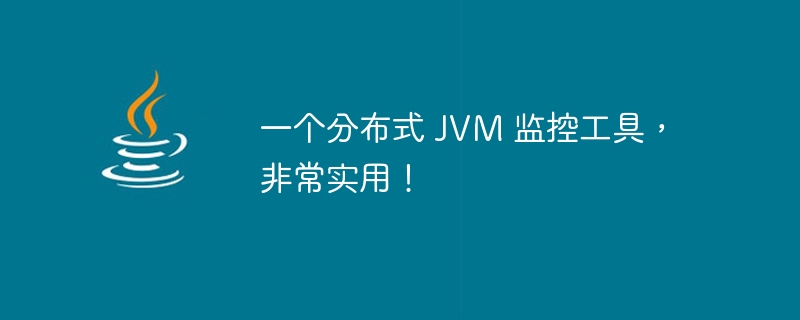 一个分布式 JVM 监控工具,非常实用!Aug 15, 2023 pm 05:15 PM
一个分布式 JVM 监控工具,非常实用!Aug 15, 2023 pm 05:15 PM该项目为了方便开发者更快监控多个远程主机jvm,如果你的项目是Spring boot那么很方便集成,jar包引入即可,不是Spring boot也不用气馁,你可以快速自行初始化一个Spirng boot程序引入jar包即可
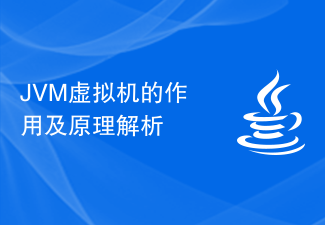 JVM虚拟机的作用及原理解析Feb 22, 2024 pm 01:54 PM
JVM虚拟机的作用及原理解析Feb 22, 2024 pm 01:54 PMJVM虚拟机的作用及原理解析简介:JVM(JavaVirtualMachine)虚拟机是Java编程语言的核心组成部分之一,它是Java的最大卖点之一。JVM的作用是将Java源代码编译成字节码,并负责执行这些字节码。本文将介绍JVM的作用及其工作原理,并提供一些代码示例以帮助读者更好地理解。作用:JVM的主要作用是解决了不同平台上Java程序的可移
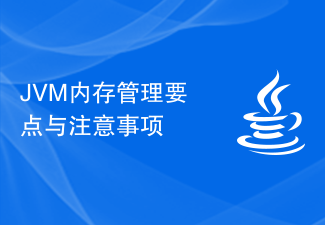 JVM内存管理要点与注意事项Feb 20, 2024 am 10:26 AM
JVM内存管理要点与注意事项Feb 20, 2024 am 10:26 AM掌握JVM内存使用情况的要点与注意事项JVM(JavaVirtualMachine)是Java应用程序运行的环境,其中最为重要的就是JVM的内存管理。合理地管理JVM内存不仅可以提高应用程序的性能,还可以避免内存泄漏和内存溢出等问题。本文将介绍JVM内存使用的要点和注意事项,并提供一些具体的代码示例。JVM内存分区JVM内存主要分为以下几个区域:堆(He
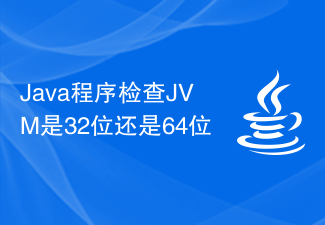 Java程序检查JVM是32位还是64位Sep 05, 2023 pm 06:37 PM
Java程序检查JVM是32位还是64位Sep 05, 2023 pm 06:37 PM在编写java程序来检查JVM是32位还是64位之前,我们先讨论一下JVM。JVM是java虚拟机,负责执行字节码。它是Java运行时环境(JRE)的一部分。我们都知道java是平台无关的,但是JVM是平台相关的。我们需要为每个操作系统提供单独的JVM。如果我们有任何java源代码的字节码,由于JVM,我们可以轻松地在任何平台上运行它。java文件执行的整个过程如下-首先,我们保存扩展名为.java的java源代码,编译器将其转换为扩展名为.class的字节码。这发生在编译时。现在,在运行时,J
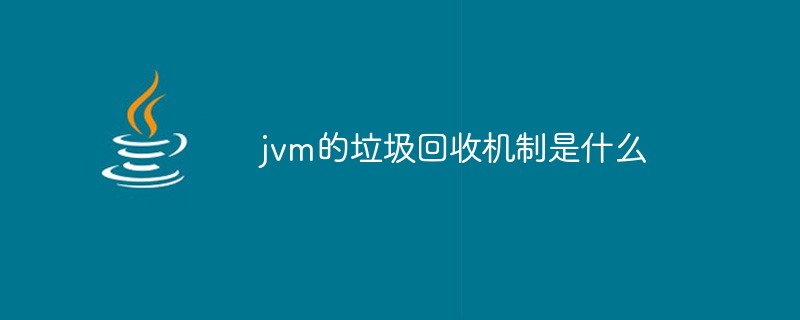 jvm的垃圾回收机制是什么Feb 01, 2023 pm 02:02 PM
jvm的垃圾回收机制是什么Feb 01, 2023 pm 02:02 PMjvm的垃圾回收机制是GC(Garbage Collection),也叫垃圾收集器。GC基本原理:将内存中不再被使用的对象进行回收;GC中用于回收的方法称为收集器,由于GC需要消耗一些资源和时间,Java在对对象的生命周期特征进行分析后,按照新生代、老年代的方式来对对象进行收集,以尽可能的缩短GC对应用造成的暂停。
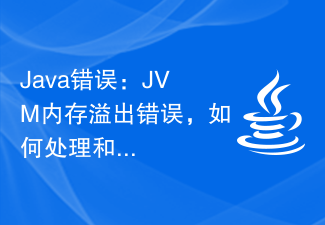 Java错误:JVM内存溢出错误,如何处理和避免Jun 24, 2023 pm 02:19 PM
Java错误:JVM内存溢出错误,如何处理和避免Jun 24, 2023 pm 02:19 PMJava是一种流行的编程语言,在开发Java应用程序的过程中,可能会遇到JVM内存溢出错误。这种错误通常会导致应用程序崩溃,影响用户体验。本文将探讨JVM内存溢出错误的原因和如何处理和避免这种错误。JVM内存溢出错误是什么?Java虚拟机(JVM)是Java应用程序的运行环境。在JVM中,内存被分为多个区域,其中包括堆、方法区、栈等。堆是用于存储创建的对象的
 Linux下Tomcat8怎么修改JVM内存配置Jun 03, 2023 am 08:43 AM
Linux下Tomcat8怎么修改JVM内存配置Jun 03, 2023 am 08:43 AMTomcat8如何修改JVM内存配置Tomcat并不建议直接在catalina.sh里配置变量,而是写在与catalina同级目录(bin目录)下的setenv.sh里。所以如果我们想要修改jvm的内存配置那么我们就需要修改setenv.sh文件(默认没有,需新建一个setenv.sh),写入(大小根据自己情况修改):exportCATALINA_OPTS="$CATALINA_OPTS-Xms1000m"exportCATALINA_OPTS="$CATALINA
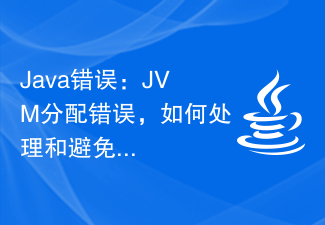 Java错误:JVM分配错误,如何处理和避免Jun 25, 2023 pm 06:25 PM
Java错误:JVM分配错误,如何处理和避免Jun 25, 2023 pm 06:25 PMJava是一种广泛使用的编程语言,它在开发大型软件系统中扮演着重要角色。与其他编程语言不同,Java采用了一种独特的内存管理方式,即垃圾回收机制。这种机制可以自动处理内存分配和释放,使得Java在编写程序时会更为方便和舒适。然而,在使用Java时,有时候会遇到JVM分配错误的情况。JVM(JavaVirtualMachine)是Java虚拟机的缩写,是执


Hot AI Tools

Undresser.AI Undress
AI-powered app for creating realistic nude photos

AI Clothes Remover
Online AI tool for removing clothes from photos.

Undress AI Tool
Undress images for free

Clothoff.io
AI clothes remover

AI Hentai Generator
Generate AI Hentai for free.

Hot Article

Hot Tools

SublimeText3 Mac version
God-level code editing software (SublimeText3)

SublimeText3 Linux new version
SublimeText3 Linux latest version

SecLists
SecLists is the ultimate security tester's companion. It is a collection of various types of lists that are frequently used during security assessments, all in one place. SecLists helps make security testing more efficient and productive by conveniently providing all the lists a security tester might need. List types include usernames, passwords, URLs, fuzzing payloads, sensitive data patterns, web shells, and more. The tester can simply pull this repository onto a new test machine and he will have access to every type of list he needs.

WebStorm Mac version
Useful JavaScript development tools

SublimeText3 English version
Recommended: Win version, supports code prompts!






